| Style, recording
date and record number |
Singer(s)
|
Title and authors |
|
Vals
02-07-35 (37785) |
|
Desde El Alma
(R. Melo, V.P. Velez) |
|
Tango
02-07-35 (37785) |
|
Hotel Victoria
(L. Negrón - see note) |
Feliciano Latasa is generally acknowledged as the
author
of (Gran) Hotel Victoria, rightfully or not. However, on 37785-B, Luis
Negrón - and not F. Latasa - is mentioned as the composer. A
discussion
of the true authorship can be found here.
|
Vals
12-08-35 (37812) |
|
Penas De Amor
(A.P. Berto) |
|
Tango
12-08-35 (37812) |
|
Tinta Verde
(A. Bardi) |
|
Tango
03-10-35 (37825) |
|
Re-Fa-Si
(E. Delfino) |
|
Vals
03-10-35 (37825) |
|
Francia
(O. Barbero) |
|
Milonga
18-11-35 (37844) |
|
De Pura Cepa
(J. Ceglie) |
|
Tango
18-11-35 (37844) |
|
Sábado Inglés
(Juan Maglio) |
|
Tango
12-12-35 (37849) |
|
Joaquina
(J. Bergamino) |
|
Vals
12-12-35 (37849) |
|
Pabellón De Las Rosas
(J. Felipetti) |
|
Vals
31-12-35 (37860) |
|
Orillas Del Plata
(J. Maglio) |
First recordings with Rodolfo Biagi at the piano (who
replaced Lidio Fasoli) |
Tango
31-12-35 (37860) |
|
Nueve De Julio
(J.L. Padula) |
|
Tango
14-01-36 (37870) |
|
La Guitarrita
(E. Arolas) |
|
Milonga
14-01-36 (37870) |
Walter Cabral
|
Silueta Porteña
(J.V. Cuccaro, N.L. Cuccaro, O. Daniel, E. Noli) |
|
Tango
31-01-36 (37883) |
|
Retintín
(E. Arolas) |
|
Vals
31-01-36 (37883) |
|
Sueño Florido
(R. Firpo) |
|
Vals
03-04-36 (37901) |
Walter Cabral
|
Un Placer
(V. Romeo, A.V. Alietti - see note) |
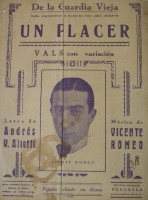 (Almost) everybody is
singing the same lyrics (Linda
mariposa tu eres mi alegria...) attributed to J.A. Caruso, including this recording. (Almost) everybody is
singing the same lyrics (Linda
mariposa tu eres mi alegria...) attributed to J.A. Caruso, including this recording.
Although the Alietti lyrics seem to exist (possibly as
used by Ignacio Corsini in 1922) mentioning him seems to be an error on the D'Arienzo record.
|
Tango
03-04-36 (37901) |
|
El Flete
(V. Greco) |
|
Vals
08-05-36 (37916) |
Walter Cabral
|
Tu Olvido
(V. Spina) |
|
Tango
08-05-36 (37916) |
|
Lorenzo
(A. Bardi, M. Pardo) |
|
Vals
09-06-36 (37937) |
Walter Cabral
|
Irene
(F.G. Jiménez, J. Servidio, L. Servidio) |
|
Tango
09-06-36 (37937) |
|
La Payanca
(A.P. Berto) |
|
Tango
03-07-36 (37955) |
|
Don Esteban
(A.P. Berto) |
Two different recordings ? Read
more.... |
Vals
03-07-36 (37955) |
|
No Llores Madre
(A.F. Roldán, F. Lauro) |
|
Tango
05-08-36 (37969) |
|
El Irresistible
(L. Logatti, M. Reguero) |
Although
this is an instrumental, the original record label mentions Mario
Reguero (pseudonym of Angel Villoldo) who wrote the first
lyrics. Later reeditions of the same recording (from the 50s) refer to
Carlos Pesce, who wrote
other lyrics much later.
Irony: some of these old tangos have more lyrics than actually recorded
performances. In this case, the only one I know of is the one by Lomuto
with Fernando Diaz (in 1931).
|
Vals
05-08-36 (37969) |
|
Inolvidable
(H.R. Demattei, V. Salerno) |
|
Tango
03-09-36 (37991) |
|
Rawson
(E. Arolas) |
|
Vals
03-09-36 (37991) |
|
Amor Y Celo
(M. Padula, A.F. Roldán) |
(Amor Y Celos on later editions)
|
Tango
29-09-36 (38009) |
|
Don Juan
(E. Ponzio, R.J. Podestá) |
|
Vals
29-09-36 (38009) |
|
Lágrimas Y Sonrisas
(P. De Gullo) |
|
Tango
27-10-36 (38032) |
|
Comme Il Faut
(E. Arolas) |
|
Vals
27-10-36 (38032) |
|
Una Lágrima
(J. Rebolini) |
|
Tango
27-11-36 (38050) |
|
Ataniche
(E. Ponzio) |
|
Vals
27-11-36 (38050) |
|
Corazón De Artista
(P. De Gullo) |
|
Tango
30-12-36 (38072) |
|
La Viruta
(V. Greco) |
|
Vals
30-12-36 (38072) |
|
Visión Celeste
(M. Padula) |
|
Polca
21-01-37 (38093) |
|
Fachimo La Polquita
(R. Duclós) |
|
Tango
21-01-37 (38093) |
|
El Baqueano
(A. Bardi) |
|
Tango
05-03-37 (38114) |
|
Qué Noche
(A. Bardi) |
|
Vals
05-03-37 (38114) |
|
Alma Dolorida
(P. Datta) |
|
Tango
01-04-37 (38138) |
|
El Apronte
(R. Firpo) |
|
Vals
01-04-37 (38138) |
|
Mentías
(J.C. Casaretto) |
|
Tango
27-04-37 (38159) |
|
Homero
(R. Firpo) |
|
Milonga
27-04-37 (38159) |
|
La Puñalada
(P. Castellanos) |
One
of the most famous milongas started its career
as a tango. At least, that is how the story goes: when D'Arienzo was in
Montevideo, Pintín Castellanos came to present him the score of
his new tango. According to some, Biagi, while trying it at the piano,
shifted the rhythm to
a milonga. Others claim that it was Juan Polito playing and that the
idea came from D'Arienzo himself. Anyway, in agreement with
Pintín Castellanos the score was adjusted accordingly.
So it is a tango milongueada
? No !, according to the record label it is a milonga tangueada...
Two months after D'Arienzo, Canaro recorded it at as a tango (but even
here we can hear that it was not a straight-out-of-the-box tango).
|
Tango
02-06-37 (38187) |
|
El Cachafaz
(M. Aróztegui) |
|
Polca
02-06-37 (38187) |
|
Amelia
(D. Santa Cruz) |
|
Tango
02-07-37 (38221) |
|
La Rosarina
(R.A. González) |
|
Vals
02-07-37 (38221) |
|
Pasión
(A. Cosentino) |
|
Tango
26-07-37 (38242) |
|
El Choclo
(A.G. Villoldo) |
|
Vals
26-07-37 (38242) |
|
Valsecito Criollo
(L. Fasoli, F.G. Jiménez) |
|
Vals
31-08-37 (38261) |
|
Valsecito De Antes
(A. Sureda) |
|
Tango
31-08-37 (38261) |
|
El Porteñito
(A.G. Villoldo, C. Pesce, A. Polito) |
|
Tango
22-09-37 (38283) |
|
El Caburé
(A. De Bassi) |
|
Milonga
22-09-37 (38283) |
|
Milonga Vieja Milonga
(F. Aranaz) |
|
Tango
29-10-37 (38305) |
Enrique Carbel
|
Paciencia
(J. D'Arienzo, F. Gorrindo) |
|
Tango
29-10-37 (38305) |
|
Jueves
(R. Rossi, U. Toranzo) |
|
Tango
09-12-37 (38327) |
|
Gallo Ciego
(A. Bardi) |
|
Tango
09-12-37 (38327) |
|
El Cencerro
(J. Martínez) |
|
Tango
14-12-37 (38326) |
|
La Cumparsita
(G.H. Matos Rodríguez) |
|
Tango
14-12-37 (38326) |
|
El Africano
(E. Pereyra) |
|
Tango
21-12-37 (38352) |
|
La Morocha
(E. Saborido) |
|
Tango
21-12-37 (38352) |
|
Melodia Porteña
(E.S. Discépolo) |
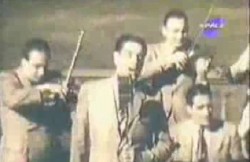 This theme is also
featured in the movie "Melodias
Porteñas", this time with Alberto Echagüe singing.
The film premiered in november 1937, so this performance preceedes the
instrumental studio recording and also the first studio recording of D'Arienzo with
Echagüe. This theme is also
featured in the movie "Melodias
Porteñas", this time with Alberto Echagüe singing.
The film premiered in november 1937, so this performance preceedes the
instrumental studio recording and also the first studio recording of D'Arienzo with
Echagüe.
The fragment is only about 1:20 long... Watch it on Youtube
|
Tango - see note
04-01-38 (38372) |
|
El Esquinazo
(A. Villoldo) |
An example of how tango history appeals to flexibility and that one should not be trapped too easily by labels.
Baptized as a tango criollo by
Villoldo, dancers will almost invariably consider all interpretations
as a milonga, even those early 20th century ones (around 1910) by the
Estudantina Centenario and Banda Internacional (but these will
never be heard in salons). On the original D'Arienzo record label (and including later reeditions) it is called a tango, as it is on records by the Quinteto Pirincho (1951). On a Firpo record on the other hand, with his cuarteto in 1939, it is designated as a milonga tangueada.
Nevertheless, that "El Esquinazo" has - always had - a certain rhythmic
twist that one should not expect from a plain tango, is also
exemplified by the following anecdote. Already in 1903, execution of
"El Esquinazo" was forbidden in Lo de Hansen.
The public got so excited, clapping hands, and also clicking cutlery
against glasses, finally throwing anything around, that - to limit the
damage - it was eventually banned: "Terminantemente prohibida la ejecución del tango El Esquinazo, se ruega prudencia en tal sentido. El propietario."
Finally, for an interesting interpretation (true tango rhythm in the first
part - milonga in the second) I refer to the Sexteto Tango recording of
1974.
|
Tango
04-01-38 (38372) |
Alberto Echagüe
|
Indiferencia
(R. Biagi, J.C. Thorry) |
First recording with Alberto Echagüe
|
Tango
07-01-38 (38368) |
|
Rodriguez Peña
(V. Greco) |
|
Tango
07-01-38 (38368) |
|
Unión Cívica
(D. Santa Cruz) |
|
Tango
23-03-38 (38412) |
|
La Mariposa
(P. Maffia) |
|
Tango
23-03-38 (38412) |
|
El Triunfo
(F. Canaro) |
|
Tango
12-04-38 (38440) |
|
El Horizonte
(R. Firpo) |
|
Vals
12-04-38 (38440) |
|
El Aeroplano
(P. Datta) |
|
Milonga
06-05-38 (38468) |
Alberto Echagüe
|
Milonga Del Corazón
(M. Bucino) |
|
Tango
06-05-38 (38468) |
|
El Cisne
(J.M. Rizzuti) |
|
Tango
08-06-38 (38474) |
|
La Catrera
(A. De Bassi) |
|
Milonga
18-06-38 (38474) |
Alberto Echagüe
|
El Temblor
(P. Castellanos) |
|
Tango
22-06-38 (38495) |
Alberto Echagüe
|
Pensalo Bien
(J.J. Visciglio, J. Alberto, N. López) |
|
Tango
22-06-38 (38495) |
|
Champagne Tango
(M. Aróztegui) |
Last recording with Rodolfo Biagi at the piano, who
leaves the orchestra, being replaced by Juan Polito. |
Tango
08-07-38 (38506) |
|
El Internado
(F. Canaro) |
|
Tango
08-07-38 (38506) |
Alberto Echagüe
|
Nada Más
(J. D'Arienzo, L. Rubistein) |
|
Tango
05-08-38 (38536) |
|
Florida
(R. Petillo) |
|
Milonga
05-08-38 (38536) |
Alberto Echagüe
|
Estampa De Varón
(M. Mores, A. Surdé) |
|
Tango
26-08-38 (38544) |
|
Lelia
(E. Arolas) |
|
Tango
26-08-38 (38544) |
Alberto Echagüe
|
La Bruja
(J. Polito, F. Gorrindo) |
|
Vals
30-09-38 (38569) |
Alberto Echagüe
|
En Tu Corazón
(H. Salgán, C. Volpe) |
|
Tango
30-09-38 (38569) |
|
Lunes
(J.L. Padula, F.G. Jiménez) |
|
Tango
03-11-38 (38601) |
|
De Mi Flor
(R. Firpo) |
|
Vals
03-11-38 (38601) |
Alberto Echagüe
|
Cabeza De Novia
(A. Aieta, N. López) |
|
Milonga
09-11-38 (38608) |
Alberto Echagüe
|
Milonga Querida
(J. Larenza, L. Bayardo) |
|
Tango
09-11-38 (38608) |
Alberto Echagüe
|
Ansiedad
(D.C. Moro, F. Gorrindo) |
|
Tango
28-12-38 (38640) |
Alberto Echagüe
|
No Mientas
(S. Varela, A. Lattero, H. Marcó) |
|
Tango
28-12-38 (38640) |
|
El Pollito
(F. Canaro) |
|
Tango
04-01-39 (38659) |
|
Pico Blanco
(A. Bardi) |
|
Tango
04-01-39 (38659) |
|
Yunta Brava
(A. Villoldo, C. Pesce, A. Polito) |
|
Milonga
03-03-39 (38676) |
Alberto Echagüe
|
Meta Fierro
(P. Castellanos) |
|
Tango
03-03-39 (38676) |
Alberto Echagüe
|
Dos Guitas
(J. D'Arienzo, F. Gorrindo) |
|
Tango
18-04-39 (38702) |
|
Maipo
(E. Arolas) |
|
Tango
18-04-39 (38702) |
|
No Me Lo Digas
(L. Visca, L. Rubistein) |
|
Tango
04-05-39 (38715) |
|
El Marne
(E. Arolas) |
|
Vals
04-05-39 (38715) |
Alberto Echagüe
|
Recuerdos De La Pampa
(R. Duclós) |
|
Tango
30-05-39 (38742) |
|
Charamusca
(F. Canaro) |
|
Tango
30-05-39 (38742) |
Alberto Echagüe
|
Olvídame
(M. Bucino) |
|
Tango
17-07-39 (38767) |
|
Derecho Viejo
(E. Arolas, A.E. Baldasari) |
|
Milonga
17-07-39 (38767) |
Alberto Echagüe
|
Milonga Del Recuerdo
(J.D. Pécora, A. Lacueva) |
|
Tango
09-08-39 (38785) |
Alberto Echagüe
|
Mandria
(J.C. Rodríguez, F. Brancatti, J.M. Velich) |
|
Vals
09-08-39 (38785) |
Alberto Echagüe
|
Castigo
(J. Polito, L. Rubistein) |
|
Tango
01-09-39 (38803) |
|
Felicia
(E. Saborido) |
|
Tango
01-09-39 (38803) |
Alberto Echagüe
|
El Vino Triste
(J. D'Arienzo, M. Romero) |
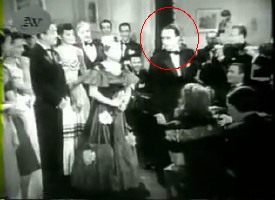 With this theme D'Arienzo participates two years later in the movie "Yo Quiero Ser Bataclana"
(Manuel Romero, 1941). The singing of Nini Marshall (in spite of being
a great actress and comedian) may not appeal to all tangueros,
nevertheless you can watch the fragment here. More about this movie at "Dime, Mi Amor" With this theme D'Arienzo participates two years later in the movie "Yo Quiero Ser Bataclana"
(Manuel Romero, 1941). The singing of Nini Marshall (in spite of being
a great actress and comedian) may not appeal to all tangueros,
nevertheless you can watch the fragment here. More about this movie at "Dime, Mi Amor" |
Milonga
27-09-39 (38817) |
Alberto Echagüe
|
De Antaño
(L. Rubistein) |
|
Tango
27-09-39 (38817) |
Alberto Echagüe
|
Santa Milonguita
(E. Delfino, E. Cadícamo) |
|
Tango
27-09-39 (38841) |
|
Don Pacifico
(A. De Bassi) |
|
Tango
27-09-39 (38841) |
Alberto Echagüe
|
Qué Importa
(R. Tanturi, J.C. Thorry) |
|
Milonga
31-10-39 (38865) |
Alberto Echagüe
|
La Cicatriz
(R. Aguirrezabalaga) |
|
Tango
31-10-39 (38865) |
|
Pampa
(F. Pracánico) |
|
Tango
14-11-39 (38887) |
Alberto Echagüe
|
Que Dios Te Ayude
(J.J. Visciglio, N. López, C. Mastronardi) |
|
Vals
14-11-39 (38887) |
Alberto Echagüe
|
Ay Aurora
(C. Gardel, J. Razzano) |
|
Tango
22-12-39 (38909) |
|
Por Que Razón
(S. Grupillo) |
|
Tango
22-12-39 (38909) |
Alberto Echagüe
|
Trago Amargo
(R. Iriarte, J.P. Navarrine) |
|
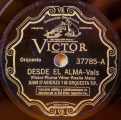
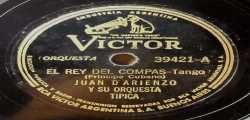





 (Almost) everybody is
singing the same lyrics (
(Almost) everybody is
singing the same lyrics ( This theme is also
featured in the movie
This theme is also
featured in the movie  With this theme D'Arienzo participates two years later in the movie "
With this theme D'Arienzo participates two years later in the movie "